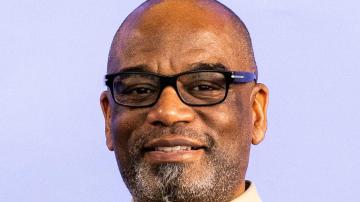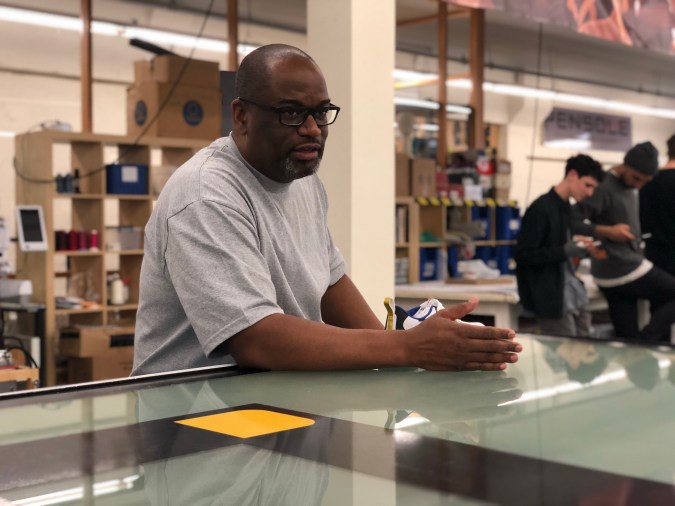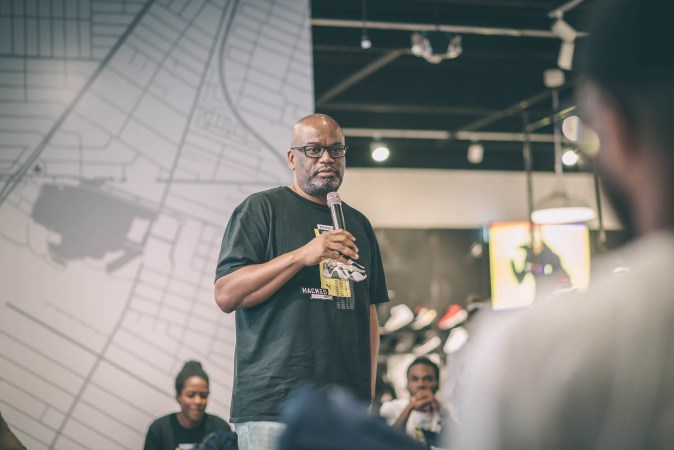HBCU President Dr. D’Wayne Edwards Went From Footwear Designer Director To Educating Brilliant Black Minds
What started with sneakers in Inglewood led to the nation’s only HBCU for design

What started with sneakers in Inglewood led to the nation’s only HBCU for design. Now, Dr. D’Wayne Edwards is on a mission to continue leaving a lasting legacy. The former Jordan Brand design director didn’t take the traditional route to higher education — in fact, he didn’t take it at all. But that didn’t stop him from making a name for himself in the footwear world and now, in the classroom.
“From the time I can remember, I was drawing,” Edwards told OffTheYard. “Growing up in the ’80s, it wasn’t the safest place. So my sanctuary was either sports or art. Eventually, that became drawing sneakers.”
In high school, he started customizing shoes to match his school colors. By 19, he landed a job designing for LA Gear. From there, he worked with streetwear legend Karl Kani, laced hip-hop icons like Biggie and Nas, and eventually got tapped by Nike to help compete with Timberland. That gig led him to Jordan Brand, where he rose to design director and spent over a decade creating some of the most iconic kicks in the game, accumulating over 50 patents and designing more than 500 footwear styles.
But something was missing.
“I didn’t see many people who looked like me,” he said. “I saw them as athletes or entertainers, not as designers sitting next to me.”
So Edwards stepped away from corporate life and leaned into purpose. He launched a design academy in Portland, further igniting his passion to mentor young Black talent to enter the design world and rise to the top. That passion led him to Detroit, where he partnered with the family of Dr. Violet T. Lewis, the founder of the Lewis College of Business, which was originally established in 1928 to train Black women for office jobs.
In 2022, Edwards reopened the school as the Pensole Lewis College of Business & Design. Today, it’s the only HBCU in the U.S. focused entirely on product creation, design, and innovation.

At PLC, students don’t just sit through lectures — they build real-world experience with top brands from day one.
“We recreate what product teams look like in actual companies — designers, engineers, color specialists, marketing — all of it,” Edwards explained. “Every course is team-based, and every course is built with a company. So by the time our students finish, they’ve already been working like professionals.”
And it’s working. In less than 10 years, nearly 1,000 students from his programs have landed jobs in the industry.
But Edwards isn’t stopping there.
He’s also one of the founding forces behind eHBCU.edu, the first-ever digital learning platform built to unify the legacy of HBCUs into one culturally rooted, online destination. It’s backed by a powerhouse coalition of six institutions — Delaware State, Alabama State, Pensole Lewis, and the three Southern University campuses in Baton Rouge, Shreveport, and New Orleans.
And in July, eHBCU made its in-person debut at the 2025 ESSENCE Festival of Culture, lighting up the Global Black Economic Forum’s Recruitment Center with an immersive, interactive activation.
From July 3 to 6, the eHBCU booth gave festivalgoers a digital taste of HBCU life. Think student-led portrait sessions, video confessionals, “What’s Your E?” reflections, and real-time storytelling that celebrated access, mentorship, and cultural pride. Thousands came through to share their journeys, snap pics, and sign up for courses, certifications, and mentorship opportunities.
On July 4, Edwards hit the GBEF Mainstage to speak on financial literacy and economic empowerment, delivering a message that resonated across generations.

“We at eHBCU understand that knowledge is wealth,” he said. “Pensole Lewis is proud to come together with our partner schools to close the knowledge and wealth gap that so many young Black Americans are facing. When we expand accessibility, we create avenues for opportunity.”
The response was overwhelming. From prospective students to media partners, the takeaway was loud and clear — HBCU excellence can now be accessed from anywhere in the world.
“eHBCU removes the geography barrier,” said Edwards. “It allows prospective, current, or former students to log in and learn from anywhere, anytime. But what’s really groundbreaking is that multiple schools are co-creating programs together.”
That means a student could, in theory, take classes from four or more HBCUs at once. The platform offers transferable credits and lets users learn on their own time, while still being rooted in Black heritage and excellence.
So what drives him to keep building, after already reaching the top of his industry?
“It’s about showing what’s possible,” he said. “Growing up, just making it to 18 was an accomplishment. I want students to see that they can go beyond survival and start shaping the world.”
Edwards is especially motivated by his daughters.
“If I could get this far using the Yellow Pages, and they’ve got the internet in the palm of their hands, the sky isn’t the limit. It’s just the beginning.”
As for his legacy, he’s laser-focused on impact.
“I want my girls and my students to know they can do anything. I’ve sacrificed so they don’t have to. And I want them to take it further than I ever could.”
To learn more about eHBCU, visit eHBCU.edu and follow @E_HBCU on Instagram, Twitter, Facebook, YouTube, and Threads.



